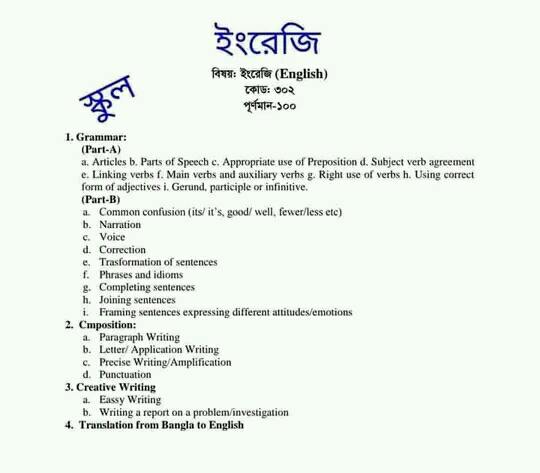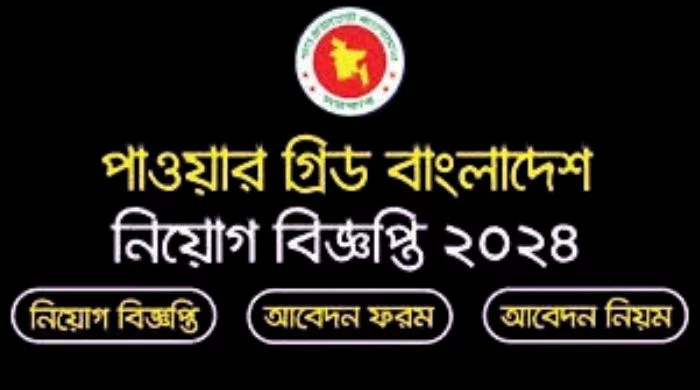NTRCA Written Syllabus is a pivotal step for educators seeking to teach in non-government educational institutions in Bangladesh. Among the various subjects included in the NTRCA written exam, English holds significant importance, especially at the school level. In this article, we aim to provide a detailed overview of the NTRCA written syllabus (school level), offering insights into the topics covered and strategies for effective preparation.
Overview of the NTRCA Written Syllabus (School):
 NTRCA School Level English Written Syllabus
NTRCA School Level English Written SyllabusThe English written test for the school-level NTRCA written exam assesses candidates’ proficiency in the English language, comprehension skills, and understanding of pedagogical principles related to English teaching. NTRCA written syllabus is designed to evaluate candidates‘ ability to teach English effectively in school settings and includes the following components:
-
- Grammar and Language Usage: Candidates are expected to demonstrate a sound understanding of English grammar, including parts of speech, sentence structure, tenses, subject-verb agreement, articles, prepositions, conjunctions, and punctuation. Questions may test candidates’ ability to identify grammatical errors, rewrite sentences, and explain grammatical concepts.
-
- Composition and Writing Skills: The composition section evaluates candidates’ writing skills, coherence, and ability to express ideas effectively in written form. Topics may include essay writing, letter writing, report writing, paragraph development, précis writing, and creative writing. Candidates are assessed on their ability to organize thoughts logically, use appropriate language and vocabulary, and maintain clarity and coherence in writing.
-
- Reading Comprehension: This section assesses candidates’ reading comprehension skills through passages of varying lengths and complexity. Candidates are required to read passages carefully and answer questions based on the content, main ideas, supporting details, vocabulary, inference, and interpretation. Questions may also test candidates’ ability to analyze and evaluate the information presented in the passages.
-
- Literature and Pedagogy: Candidates are expected to have a basic understanding of English literature, including significant literary works, authors, literary genres, themes, and literary devices. Questions may also focus on pedagogical principles related to teaching English, such as lesson planning, instructional strategies, classroom management, assessment methods, and the use of teaching aids and resources.
Strategies for Effective Preparation:
-
- Understand the Syllabus: Familiarize yourself with the NTRCA school level English written syllabus to identify the topics and areas of focus. Create a study plan that allocates sufficient time for each component of the syllabus.
-
- Strengthen Grammar Skills: Focus on mastering English grammar by reviewing fundamental grammar rules, practicing grammar exercises, and solving sample questions. Pay attention to areas of weakness and seek clarification on any concepts that you find challenging.
-
- Practice Writing: Enhance your writing skills by practicing different types of writing tasks, such as essay writing, letter writing, and paragraph development. Pay attention to structure, coherence, vocabulary, and language usage in your writing. NTRCA school level English written syllabus
-
- Improve Reading Comprehension: Develop your reading comprehension skills by regularly reading English texts of varying genres and difficulty levels. Practice summarizing passages, identifying main ideas, making inferences, and answering comprehension questions.
-
- Study Literature: Familiarize yourself with significant works of English literature, authors, literary genres, themes, and literary devices. Analyze sample literary texts and practice answering questions related to literary analysis and interpretation.
-
- Review Pedagogical Principles: Gain an understanding of pedagogical principles related to teaching English in school settings. Review teaching methodologies, classroom management techniques, assessment strategies, and the use of teaching aids and resources.
NTRCA written syllabus:
NTRCA school level English written syllabus requires thorough preparation and a comprehensive understanding of English language concepts, writing skills, reading comprehension, literature, and pedagogy. By following the guidelines outlined in this article and dedicating sufficient time and effort to preparation, candidates can enhance their readiness and increase their chances of success in the written exam. Best of luck with your preparation!
The 19th NTRCA written syllabus for the college level typically includes subjects based on the disciplines and academic areas in which candidates will be teaching. Below is a generalized syllabus structure that usually follows the NTRCA pattern:
1. Bangla (200 Marks) NTRCA written syllabus
- Paper 1 (100 Marks):
- Bangla Literature (Ancient, Medieval, Modern, and Contemporary periods)
- Bangla Grammar
- Essay and Precise Writing
- Paper 2 (100 Marks):
- Poetry, Prose, Drama, Novels from significant Bangla literary figures.
- Critical analysis and summaries.
2. English (200 Marks) NTRCA written syllabus
- Paper 1 (100 Marks):
- English Grammar & Vocabulary
- Sentence structure, error correction, prepositions, tenses.
- Paper 2 (100 Marks):
- English Literature (Classical, Romantic, Victorian, Modern periods)
- Important literary figures, movements, and critical essays.
3. General Knowledge (200 Marks) NTRCA written syllabus
- Bangladesh Affairs (100 Marks):
- History, Culture, Geography of Bangladesh
- Politics, Economy, Constitution, and significant events.
- International Affairs (100 Marks):
- World Geography, Political history, International organizations.
- Current global issues.
4. Mathematics (200 Marks) NTRCA written syllabus
- Paper 1 (100 Marks):
- Algebra, Arithmetic, Trigonometry, Geometry, Set theory.
- Paper 2 (100 Marks):
- Calculus, Matrix Algebra, Complex Numbers, Probability, and Statistics.
5. Science Subjects (200 Marks)
- Physics, Chemistry, Biology (Depending on the subject chosen):
- Subject-specific advanced topics.
- Theories, Principles, Problem-solving techniques.
- Paper 1 (100 Marks): Core Concepts.
- Paper 2 (100 Marks): Application and Advanced Level Questions.
6. ICT (Information and Communication Technology) (100 Marks)
- ICT in Education
- Basic Computing (Software, Hardware, Internet, MS Office Suite)
- Networking, Database Management Systems, and Software Development Fundamentals.
7. Education Pedagogy (100 Marks)
- Educational Psychology: Learning theories, Motivation, and Classroom Management.
- Teaching Methods: Subject-specific teaching methods, techniques, and tools.
- Curriculum Development: Modern educational trends and curriculum structuring.
- Assessment & Evaluation: Methods of student evaluation, Question paper preparation.
8. Subject-specific papers (200 Marks)
- For example, Economics, History, Geography, Political Science, Accounting, Business Studies, Islamic Studies etc., depending on the subject the candidate is applying to teach.
- Subject knowledge: Advanced topics in respective fields.
- Paper 1 (100 Marks): Core Concepts.
- Paper 2 (100 Marks): Analysis and Application.
9. Optional Subjects (Arts, Social Science, Commerce, etc.)
- Varies based on the subject chosen by the candidate.
10. Viva Voce (100 Marks)
- General questions based on the candidate’s subject.
- Current affairs and teaching-related questions.
What is the age limit for NTRCA exam?
The Non-Government Teachers’ Registration and Certification Authority (NTRCA) exam in Bangladesh has specific age limit criteria for applicants. As of the most recent guidelines:
For Freedom Fighter Quota Candidates: The maximum age limit is up to 40 years.
For General Candidates: The maximum age limit is 35 years.
This syllabus might vary slightly depending on updates and modifications issued by NTRCA for the specific year’s examination. Always check the official NTRCA notification for the latest syllabus details.
What are the literary terms for NTRCA?
English Literature Terms:
Tone: The author’s attitude toward the subject or audience.
Allegory: A narrative in which characters and events symbolize broader themes, typically moral, political, or spiritual concepts.Alliteration: Repetition of consonant sounds at the beginning of words in a sentence or phrase.
Allusion: A reference to another work of literature, person, or event.
Antithesis: A contrast or opposition between two things.
Apostrophe: A figure of speech where the speaker addresses an absent person or a personified object.
Assonance: Repetition of vowel sounds within close proximity.
Blank Verse: Unrhymed iambic pentameter.
Caesura: A pause in a line of poetry, typically near the middle.
Consonance: Repetition of consonant sounds, typically at the end of words.
Couplet: Two consecutive lines of poetry that usually rhyme.
Elegy: A poem of serious reflection, typically a lament for the dead.
Epic: A long narrative poem about heroic deeds.
Hyperbole: Exaggeration for effect.
Irony: A discrepancy between expectation and reality, often used for humor or emphasis.
Metaphor: A figure of speech that makes a comparison between two unlike things.
Meter: The rhythmical pattern of a poem.
Oxymoron: A figure of speech that combines contradictory terms.
Personification: Assigning human qualities to non-human objects or beings.
Simile: A comparison using “like” or “as”.
Sonnet: A 14-line poem with a specific rhyme scheme, often dealing with themes of love or nature.
Symbolism: The use of symbols to represent ideas or qualities.
Theme: The central idea or underlying meaning of a literary work.
 Sopner BCS Sopner BCS: We fuel your BCS dreams
Sopner BCS Sopner BCS: We fuel your BCS dreams





One comment
Pingback: Phrases and Idioms:18 NTRCA School Level Written Suggestion - Sopner BCS